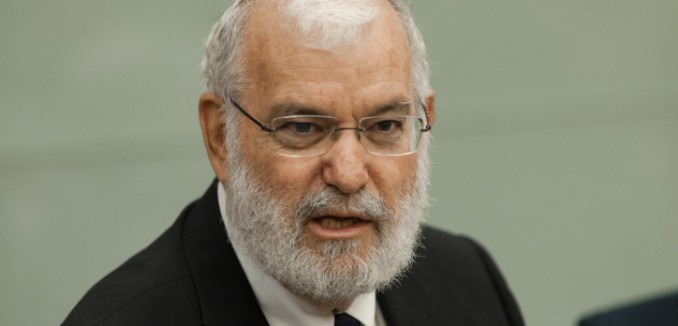Israel’s former national security advisor hailed the recently announced reconciliation agreement between Israel and Turkey on Monday, telling reporters it has the potential to greatly improve diplomatic and economic ties between the two nations.
“Trade between Israel and turkey has more than doubled from the Marmara event up until today,” said Maj. Gen. (ret.) Yaakov Amidror, in reference to the IDF’s 2010 operation to block the MV Mavi Marmara from breaking Israel’s legal naval blockade of the Hamas-ruled Gaza Strip. IDF troops faced an “organized and violent” assault from a group of passengers after boarding the ship, according to a UN report and video footage, and ten crew members were killed in the ensuing fight. The incident sparked a diplomatic crisis between Ankara and Jerusalem.
The reconciliation agreement will help Israel and Turkey bolster their flourishing bilateral trade, which reached $5.6 billion in 2014 according to Israeli officials, with “joint projects in government level. People are speaking about gas and there are other issues that might emerge,” Amidror added.
Normalized Israeli-Turkish relations are seen as critical to helping Israel capitalize on its natural gas reserves, with Prime Minister Benjamin Netanyahu telling reporters on Monday that the reconciliation deal will open Turkey to Israeli natural gas exports, and that the country could possibly serve as a gateway to European markets.
Ankara and Jerusalem have already discussed building a natural gas pipeline from Israel to Europe via Turkey, a plan that “has been supported by the Obama administration as a conduit to promote peace between Israel and its neighbors,” the Wall Street Journal reported. “Ankara also has been looking for ways to diversify its energy sources after falling out with Russia, one of its biggest trading partners. Turkey receives most of its gas from Russia and is eager to establish a pipeline from Israel’s major gas field,” the Journal added.
Israeli energy stocks and shares in Turkey’s Zorlu Energy rose in reaction to the agreement, according to Reuters.
“Remember, we are now in a very volatile area,” Amidror stressed. “It would be a huge mistake by both [Israel and Turkey] not to use this opportunity to build better relations and better trade.” He added that he would welcome the inclusion of more Middle Eastern countries in this effort, saying “the more, the better.”
“The potential is huge but we need time to build this trust and understanding. I am not sure that it will come, but at last we have a good beginning,” Amidror continued.
He also encouraged Israel to strengthen relations with Egypt, Greece, and Cyprus in the wake of the agreement, noting that those countries are weary of Turkish intervention in Gaza and the Middle East. “All of them do not like the Turks, but all of them have today much better relations with Israel than in the past, and what should be done by Israel today is to enhance it and invest in these relations with these three countries. And both sides, the Turks on one side, and Cyprus, Greece, and Egypt on the other side, should understand that it’s in the interest of the region that Israel can have good relations with both.”
Responding to a question about some domestic criticism of the reconciliation deal, Amidror said the agreement was worth its price and should have been secured years ago. “It is very clear for me that it’s high time to have this agreement,” he added. “Criticism is part of democracy, the job of the opposition is to criticize, and the job of the government is to implement.”
[Photo: Flash 90]




